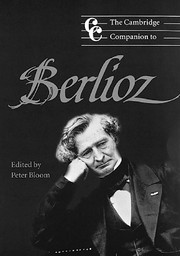Book contents
- Frontmatter
- Introduction: Berlioz on the eve of the bicentenary
- Part I Perspectives
- Part II Principal compositions
- 3 Genre in Berlioz
- 4 The symphonies
- 5 The concert overtures
- 6 The operas and the dramatic legend
- 7 The religious works
- 8 The songs
- Part III Major writings
- Part IV Execution
- Part V Critical encounters
- Part VI Renown
- Notes
- Bibliography
- Index
8 - The songs
from Part II - Principal compositions
Published online by Cambridge University Press: 28 September 2011
- Frontmatter
- Introduction: Berlioz on the eve of the bicentenary
- Part I Perspectives
- Part II Principal compositions
- 3 Genre in Berlioz
- 4 The symphonies
- 5 The concert overtures
- 6 The operas and the dramatic legend
- 7 The religious works
- 8 The songs
- Part III Major writings
- Part IV Execution
- Part V Critical encounters
- Part VI Renown
- Notes
- Bibliography
- Index
Summary
Berlioz's romances and mélodies – in particular Les Nuits d'été – occupy a key position in the historiography of French song. Berlioz, the “renovator” of so much French music, has been seen as the composer whose various accomplishments include the transformation of the apparently insipid romance into a serious form on the model of the German Lied. His admiration for Schubert's songs, expressed directly in his reviews and indirectly in his orchestration of Erlkönig as Le Roi des aulnes (1860), serves as evidence of his esteem for the more exalted genre just as much as does his oft-stated scorn for salon romances and for the dilettante musicianship usually associated with them. Thus, to the notion of Berlioz the creator of the ideal romantic symphony has been wedded the notion of Berlioz the creator of the ideal romantic song.
Similarly, Les Nuits d'été, his “masterpiece,” seems to tower over all other “normal” contemporary song production. How then, in the “shadows” of Les Nuits d'été (to use Peter Bloom's expression), are we to view normal works in the category – including Berlioz's own – and how can such normal works enlighten our understanding of French song as a whole?
Romances
Berlioz's romances pose a problem for musicologists who adhere to the ideology of musical progress which demands that a composer canonized as a “genius” compose art for art's sake and put his stamp both upon the music of his own period and upon posterity. Indeed, Berlioz himself was instrumental in creating the concept of the “great composer” – his prime example was Beethoven – as the progressive genius who transgresses the conventions of musical genre.
- Type
- Chapter
- Information
- The Cambridge Companion to Berlioz , pp. 108 - 124Publisher: Cambridge University PressPrint publication year: 2000
- 1
- Cited by

